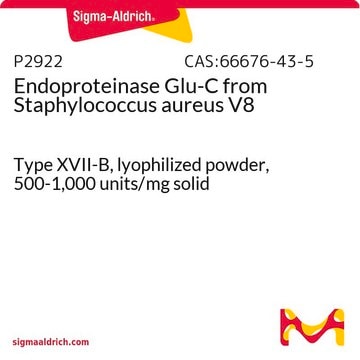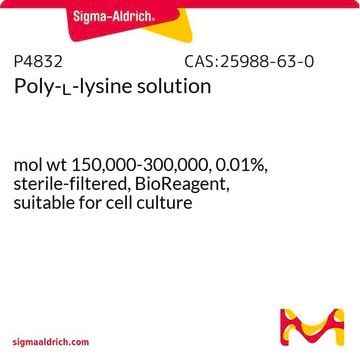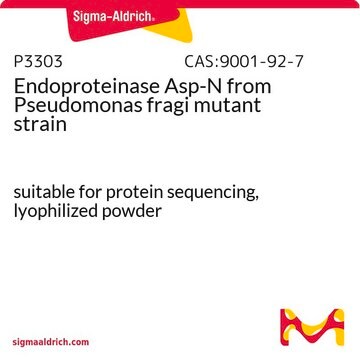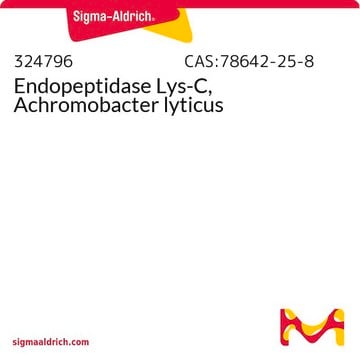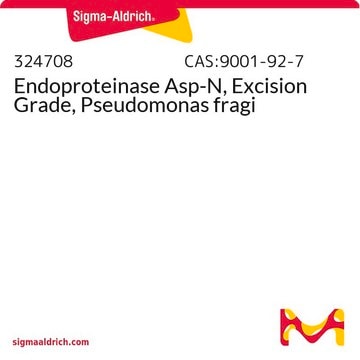P6181
Endoproteinase Glu-C from Staphylococcus aureus V8
suitable for protein sequencing, lyophilized powder
Synonym(s):
V8 Protease
Sign Into View Organizational & Contract Pricing
All Photos(1)
About This Item
CAS Number:
EC Number:
MDL number:
UNSPSC Code:
12352204
NACRES:
NA.54
Recommended Products
grade
Proteomics Grade
Quality Level
form
lyophilized powder
analyte chemical class(es)
amino acids
suitability
suitable for protein sequencing
storage temp.
−20°C
Looking for similar products? Visit Product Comparison Guide
Application
Endoproteinase Glu-C from Staphylococcus aureus V8 has been used for:
- obtaining proteolytic cleavage fragments of the S-layer protein (from Bacillus stearothermophilus ATCC 12980) to perform affinity studies.
- the enzymatic cleavage of native VSTx-3 (voltage sensor toxin 3) peptide for its sequence determination.
- limited proteolysis of recombinant purified PimA (phosphatidylinositol mannosyltransferase).
- the digestion of glycosylated hemoglobin for isotope dilution liquid chromatography-tandem mass spectrometry analysis.
Biochem/physiol Actions
Endoproteinase Glu-C from Staphylococcus aureus strain V8 is a serine endoprotease, which hydrolyzes peptide bonds at the carboxyl side of glutamyl and aspartyl residues. The specificity of Glu-C is dependent upon the buffer and pH employed as well as the structure around the potential cleavage site. In ammonium acetate (pH 4.0) or ammonium bicarbonate (pH 7.8), the enzyme preferentially cleaves glutamyl bonds; whereas, in phosphate buffer (pH 7.8) Glu-C will cleave at either site. Glu-C is reported to be active in the presence of 0.2% SDS (sodium dodecyl sulfate) and in 4.0M urea.
Signal Word
Danger
Hazard Statements
Precautionary Statements
Hazard Classifications
Resp. Sens. 1 - Skin Sens. 1
Storage Class Code
11 - Combustible Solids
WGK
WGK 3
Personal Protective Equipment
dust mask type N95 (US), Eyeshields, Gloves
Certificates of Analysis (COA)
Search for Certificates of Analysis (COA) by entering the products Lot/Batch Number. Lot and Batch Numbers can be found on a product’s label following the words ‘Lot’ or ‘Batch’.
Already Own This Product?
Find documentation for the products that you have recently purchased in the Document Library.
Customers Also Viewed
R Pietropaolo et al.
The Journal of general virology, 80 ( Pt 7), 1807-1816 (1999-07-28)
Annexin II has been identified as a human cytomegalovirus (HCMV)-binding protein, shown to be a component of purified virions and proposed as a cellular receptor for the virus. In addition, annexin II is capable of associating with the major HCMV
Q Xu et al.
The Biochemical journal, 341 ( Pt 3), 733-737 (1999-07-27)
A galactose-binding lectin isolated from the venom of Trimeresurus stejnegeri is a homodimer C-type lectin. The cloned cDNA encoding the monomer of Trimeresurus stejnegeri lectin (TSL) was sequenced and found to contain a 5'-end non-coding region, a sequence which encodes
Secondary structure reshuffling modulates glycosyltransferase function at the membrane.
Giganti D et al.
Nature Chemical Biology, 11, 16-16 (2015)
M Malkoski et al.
Antimicrobial agents and chemotherapy, 45(8), 2309-2315 (2001-07-14)
Caseinomacropeptide (CMP) is a heterogeneous C-terminal fragment (residues 106 to 169) of bovine milk kappa-casein composed of glycosylated and phosphorylated forms of different genetic variants. We have demonstrated that CMP has growth-inhibitory activity against the oral opportunistic pathogens Streptococcus mutans
X. Wang et al.
Plant physiology, 111(2), 441-445 (1996-06-01)
Ribulose-1,5-bisphosphate carboxylase/oxygenase (Rubisco) and a 66-kD protein were co-purified from solubilized microsomal preparations of the green alga Botryococcus braunii by Green A agarose, sucrose density gradient, MonoQ, and gel filtration. The 66-kD protein remained intact after 6 M urea treatment
Our team of scientists has experience in all areas of research including Life Science, Material Science, Chemical Synthesis, Chromatography, Analytical and many others.
Contact Technical Service
